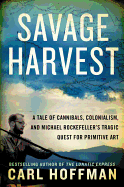
The 1961 disappearance of 23-year-old Michael Rockefeller off the coast of New Guinea triggered decades of dark rumors regarding his possible fate at the hands of cannibals. Though Rockefeller was officially declared dead by drowning, no physical evidence was ever found of his doomed attempt to reach shore from his capsized boat. Carl Hoffman's Savage Harvest presents a nearly conclusive chronicle of Rockefeller's disappearance, reopening the case with new evidence--gleaned in part through months spent among descendants of the Asmat tribesmen who likely killed and consumed the young explorer.
Western New Guinea of the late 1950s and early 1960s was a largely ungoverned Netherlands colony, an isolated expanse of Stone Age tribes with a handful of Dutch missionaries and administrators. The Asmat, an ethnic group on the Arafura Sea, still practiced their ancient traditions, including ritualized cannibalism, despite an unenforceable ban by the Dutch. Just three years before Rockefeller's arrival, an overzealous Dutch administrator had killed five Asmat men during an armed patrol. The tribe members believed their slain relatives could not find peace until their deaths were "balanced," a debt incurred by usually untouchable white men--which suddenly became repayable when they found an exhausted Rockefeller.
Hoffman's own journeys through modern Asmat mix introspective travelogue with historical investigation. His findings are fascinating, if never quite conclusive. Even a month living in an Asmat village fails to elicit any confessions or physical proof of Rockefeller's fate. However, Hoffman's evidence, though circumstantial, is the strongest indication yet Michael Rockefeller was one of the final victims of headhunting in Asmat. --Tobias Mutter, freelance reviewer

